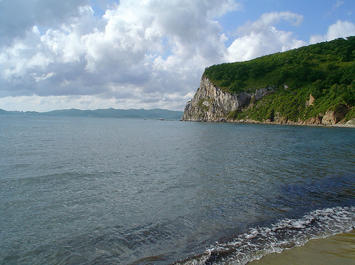
Call it 'Nomenclature Nationalism', or 'The Tyranny of Also Known As'. The Virginia state legislature ventured into unfamiliar foreign policy waters earlier this month when it passed a law that requires school text book publishers to add six little words in reference to the body of water usually known as the Sea of Japan: “also known as the East Sea”. New York and New Jersey have now also placed the item on their state agendas. The moves reflect a trend: Geographic nomenclature is becoming a frontline in nationalism, particularly in Asia.
The legislation in Virginia would seem to be a rather small bore triumph of South Korean sentiments and organization by Korean voters in local U.S. elections. But it is being treated as a major victory in Seoul, and as a defeat for Japan, which went out of its way to try to forestall the legislation, even hinting that the language might jeopardize Japanese investment in the state.
For the past twenty years, South Korea has been laboring mightily to persuade the rest of the world to use its designation for the body of water that separates it from Japan, or, if not, to at least acknowledge an alternative designation.
Until recently, those efforts have not met with much success. In 2012, South Korea officially asked the International Hydrographic Organization to use the term 'East Sea' for the Sea of Japan. It turned down the request after Washington officially advised the organization against it.
The U.S. Board of Geographic Names, which guides the government on nomenclature issues, also uses Sea of Japan alone, and China and Russia, two countries contiguous to the waters, use variations of the words Sea of Japan in their own languages. The Google Maps search bar brings up 'also known as the East Sea' in Sea of Japan searches, but designates the waters as Sea of Japan on its map.
The number of “also known as…” constructions are proliferating in Asia, clogging up prose and imposing a kind of political correctness on international publications. When writing about Asian issues, journalists and other writers now routinely struggle to appear even-handed.
It has become, of course, common place to now refer to the uninhabited rocks in the East China Sea — the area that is bringing China and Japan closer to war — as 'Senkaku, also known as Diaoyu'. Never mind that the English language publications in China, such as South China Morning Post, don’t bother with such even-handedness, simply calling them 'the Diaoyu'.
Similarly, the disputed islands in the Sea of Japan are usually described as 'Dokdo, also known as Takeshima', though there is, in this case, a third neutral term. The U.S. officially calls them the Lioncourt Rocks, after the French vessel that “discovered” them.
How far down this road must we travel? A half a dozen countries border on the body of water commonly known in English as the South China Sea, each one with its own geographic name for it. So must we, in total neutrality, of course, write 'South China Sea – also known as Nan Hai (Chinese), Bien Dong (Vietnamese) or the West Philippine Sea'?
Manila was perfectly content to refer to the waters in question as the South Sea, until several atolls became objects of disputed ownership. Beginning in 2012, it decided to call the waters 'the West Philippine Sea,' to reinforce its claims to these atolls and islands. The ocean to the east of the Philippines is still known simply as the Philippine Sea.
Issues on dry land include 'Myanmar, also known as Burma', as many publications now refer to the Southeast Asian country. Both words approximate what Burmese call their country, but Myanmar has an unsavory pedigree. In 1989 the military junta known as the State Law and Order Council (SLORC) decreed that Burma was a colonial-era name, and that henceforth it would like to be called Myanmar.
Coming only a year after the bloody suppression of pro-democracy protests in Rangoon (Yangon), there were grounds to question the legitimacy of the name change. The SLORC has passed into history, and Myanmar has gained acceptance almost everywhere except, significantly, the U.S. State Department and among some dissident publications based in Thailand.
A similar situation arose in India when the Shiv Sena, an unsavory, right-wing nationalist party, won control of Maharashita State and declared that the name of its capital, Bombay, was also a colonial relic and would henceforth be known as Mumbai. The Shiv Sena are long out of power, but Mumbai has out-grown its origins and gained international acceptance — along with Chennia (Madras) and Kolkata (Calcutta).
One should probably be grateful that other Asian countries haven’t yet joined the nationalist nomenclature bandwagon to dump “colonial era” names. The Thais don’t insist that we call their capital city Krungthep instead of Bangkok. Beijing doesn’t insist that we exchange 'China' for the tongue twister Zhonggou, and Tokyo doesn’t insist we use Nippon – also known as Japan.
Todd Crowell is author of the forthcoming The Dictionary of the Asian Language. He is based in Tokyo.
Flickr photo by paukrus: Sea of Japan near Nahodka













I like online games. Not
I like online games. Not only me but also my children like to play all types of online games. They do it in regular basis. They are smart or expert than me in this situation. The demand of online games especially shooting games becomes more popular among kids. To facilitate this there are several points which are providing such types of games facility. No doubt we will enjoy that place with our favorite games.
Bad legal precedent...
This is a very bad legal precedent...
Read why with my published op-ed "Drafting American school children in a diplomatic war" @ http://bit.ly/NyL21J